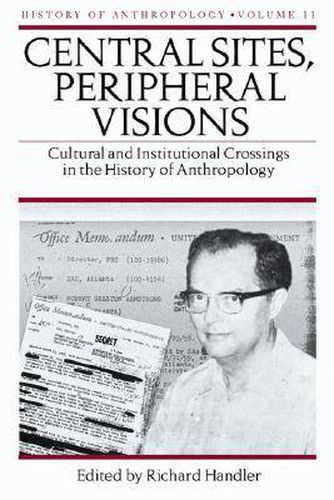Readings Newsletter
Become a Readings Member to make your shopping experience even easier.
Sign in or sign up for free!
You’re not far away from qualifying for FREE standard shipping within Australia
You’ve qualified for FREE standard shipping within Australia
The cart is loading…






Central Sites, Peripheral Visions presents five case studies that explore the dilemmas, moral as well as political, that emerge out of anthropology’s unique position as both central and peripheral. From David Koester’s analysis of how ethnographic descriptions of Iceland marginalized that country’s population, to Kath Weston’s account of an offshore penal colony where officials mixed prison work with ethnographic pursuits, from Brad Evans’ reflections on the
bohemianism
of both the Harlem vogue and American anthropology, to Arthur J. Ray’s study of anthropologists who serve as expert witnesses in legal cases, the essays in the eleventh volume of the
History of Anthropology
series reflect on anthropology’s always problematic status as centrally peripheral, or peripherally central. Finally, George W. Stocking, Jr., in a contribution that is almost a book in its own right, traces the professional trajectory of American anthropologist, Robert Gelston Armstrong, who was unceremoniously expelled from his position at the University of Chicago because of his communist sympathies in the 1950s. By taking up Armstrong’s unfinished business decades later, Stocking engages in an extended meditation on the relationship between center and periphery and offers
a kind of posthumous reparation,
a page in the history of the discipline for a distant colleague who might otherwise have remained in the footnotes.
$9.00 standard shipping within Australia
FREE standard shipping within Australia for orders over $100.00
Express & International shipping calculated at checkout
Central Sites, Peripheral Visions presents five case studies that explore the dilemmas, moral as well as political, that emerge out of anthropology’s unique position as both central and peripheral. From David Koester’s analysis of how ethnographic descriptions of Iceland marginalized that country’s population, to Kath Weston’s account of an offshore penal colony where officials mixed prison work with ethnographic pursuits, from Brad Evans’ reflections on the
bohemianism
of both the Harlem vogue and American anthropology, to Arthur J. Ray’s study of anthropologists who serve as expert witnesses in legal cases, the essays in the eleventh volume of the
History of Anthropology
series reflect on anthropology’s always problematic status as centrally peripheral, or peripherally central. Finally, George W. Stocking, Jr., in a contribution that is almost a book in its own right, traces the professional trajectory of American anthropologist, Robert Gelston Armstrong, who was unceremoniously expelled from his position at the University of Chicago because of his communist sympathies in the 1950s. By taking up Armstrong’s unfinished business decades later, Stocking engages in an extended meditation on the relationship between center and periphery and offers
a kind of posthumous reparation,
a page in the history of the discipline for a distant colleague who might otherwise have remained in the footnotes.